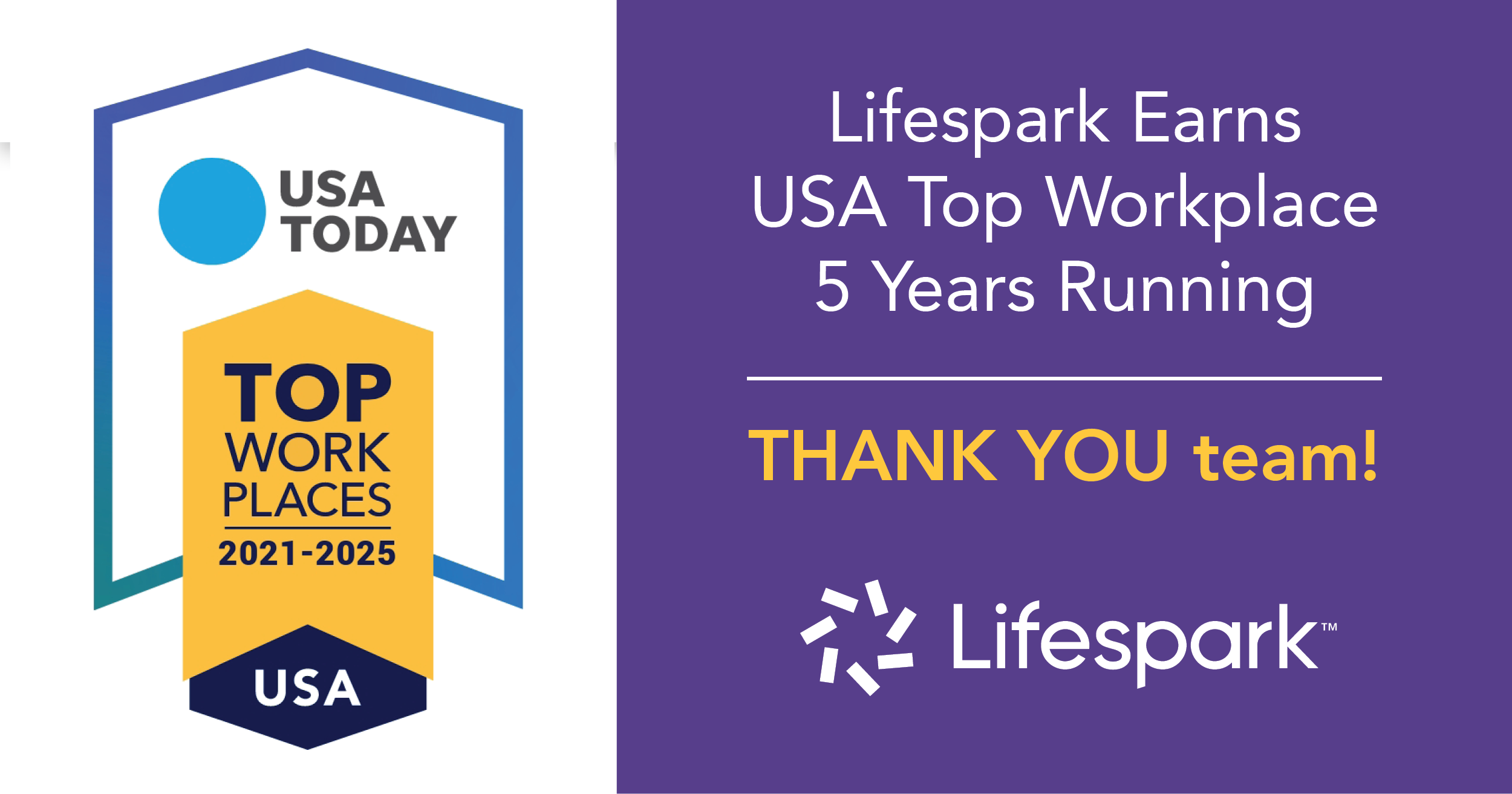
An RN Roundtable Discussion
Nurses everywhere continue to shine, even as the ground shifts beneath their feet. Their needs, responsibilities, and reactions are changing at the same speed. That’s why we look for ways to stay plugged into the minds and hearts of our Lifespark nurses. Like our most recent RN Roundtable discussion where we asked our nurses to share with us what it’s really like to be a nurse today.
We invited five nurses from across the company in various nursing roles from home health, home care, hospice, to population health — to just listen. During National Nurses Week, one of the best things we can do for our nurses is do just that — listen — and hear in their words the pulse of the nursing and health care industry. It’s the best way to make sure that what we’re providing matches their expectations. Afterall, sparked nurses feel a renewed sense of passion and purpose. And that makes it easier for them to create powerful experiences for the people in their care. In a time of incredible burnout among health care workers, bringing joy to their lives is paramount. And quite frankly, it’s part of what being “human-centered” means.
The transparent conversation that we had with our nurses might just get you thinking about your own career. After you watch the conversation unfold, we hope you’ll share with us your own answers to some of the questions. If you’re a nurse, we want to know your thoughts. Whether you work for us or not.
Of course, not all the news at the RN Roundtable was good. It was hard to hear about the new burdens nurses are forced to carry. But what we learned was priceless. It was an hour filled with equal parts education and inspiration.
Here are some of the highlights from that discussion, which had us smiling and in tears — and once again, in awe of the work nurses do every day.
TOPIC: Why you became a nurse
Bobbie Jean Mertens – RN Case Manager, Skilled Home Health: “Definitely my grandpa was my inspiration. I was 16. I couldn’t fix him. It’s hard being in that position that you feel helpless. So, it just gave me that push of, yeah, I want to do something so that I can be in a better place to help somebody else’s grandpa.”
TOPIC: The best parts of your job
Lexi Ternes – RN Case Manager, Hospice: “For me, about a third of my clients are in their private homes. To help a family member walk through the process of ‘Where do we go from here?’ And to provide that education, to help them know what to expect. To be that shoulder that they get to cry on when their loved one is making major declines. It is an honor to be able to say, ‘My job is to just care about people.’”
Lori Anderkay – Clinical Educator, Skilled Home Health: “I have a great example of a client who was a retired nurse. (She) would not take her medication because they changed the color and the shape. She was noncompliant for probably at least two years. So, I got creative, and I made a colored diagram of all of her medications with the shape and the color. And it took something that small, you know, to be able to help her to take her medications.”
Christie Hendel – Clinical Manager, Community Home Care: “You can see (clients) struggling deep down, but they don’t want to really tell their family. So, they kind of put all their trust into you. And so being a nurse, I mean, that’s one of the best things. Being that person they can turn to and talk to and trust.”
TOPIC: The Lifespark continuum of support for clients
Christie: “In home care, hospice, any of our (service lines) here, we all get to follow them (our clients). We know what happens. We see them the day they get home or the day they’re at their new facility. And it’s just great to see the family develop. You get to meet new grandkids; you get to see all of the really fun parts of life that not everybody gets to see.”
Kari Schwartz – Life Manager, Lifespark COMPLETE/Population Health: “To be in a position where you’re able to refer somebody or educate them if that next move is to hospice or changing their living conditions. And being able to give them a choice. Give them resources that can help them, and yet still being with them during that transition. You’re not saying goodbye. I think that is so important for those families — and for the client — because you’ve built those relationships.”
TOPIC: The tough parts of your job
Bobbie Jean: “A lot of our folks don’t go to a TCU, so they’re coming back to us so much sicker. Or less stable than they would have been. So, you’re doing a lot more education or doing a lot more intervention. It’s tough some days. You know, they should be in a setting where they have a physician and a nurse there, 24/7. And you’re trying to organize family and make sure meds and everything are as best as we can get them in a very short amount of time.”
Kari: Especially these last few years when it’s been very, very, very challenging. I mean, there’s days that go by that you think, ‘How am I going to get through this day?’ And so, I am just so appreciative and thankful for the support that we do have. And it truly does come from the heart. I mean, I think we’ve all been stretched thin, and we can see those true colors come out.
TOPIC: When COVID was at its worst
Lori: “So, you can go and see the client, but you’re keeping that six feet. You have your mask on, you have a shield on. They can’t see if you’re smiling. You can’t give them a hug if they’re having a bad day.”
Bobbie Jean: “Losing that family connection — I mean, I remember blocking two-hour time slots on my schedule just because I was the only person that they knew. And they’re seeing their family through the plate glass window. And you are the only one that they can really connect with and remember. And you’re almost like their lifeline. They look forward to your visits, and you give them a reason to keep going.”
TOPIC: The broken health care system
Kari: “I really feel strongly that there is so much more that can be done in the current health care system. And that is truly one of the reasons I’m still here with Lifespark. I feel like we finally are achieving that. And I just think it’s only going to get better from here. Thanks to Joel (Joel Theisen, CEO/Founder, RN, BSN) and his perseverance. We will definitely see this through to the end. It’s brought back, in my eyes, true health care and true nursing. And the way we deliver that, you know, is second to none. And I think every single individual deserves this.”
TOPIC: The level of support for employees at Lifespark
Lexi: “Your first day of coming into this team, you really sense how different this is from a lot of different teams, companies, health care systems. I thought, ‘Wow, this is kind of wild.’ In my experience with health care and teams, you see a lot of (people) finding what’s wrong and then complaining about it. And ever since I’ve joined this team, instead it’s, ‘Let’s try to fix it.’ And the beautiful thing about Lifespark is that everyone seems to be in this mindset and goal of ‘How can we serve the community? How can we serve the team?’ It’s so optimistic and so life-giving.”
Lori: “I refer to Lifespark as the A-Team. Because if you don’t know, or you don’t have the answer, someone here is going to. It can be speech therapy. It can be physical therapy. It can be community health. It can be your manager. Someone’s going to have what you need to succeed with whatever roadblock you’ve run into.”
Can we summarize the RN Roundtable in one sentence?
“Lifespark nurses want to make a difference!”
As you watch the video of our RNs responding to questions at the roundtable, that’s the message you hear underlying most answers. Our nurses want to give their clients the best possible life. They want to be part of the movement to help people age magnificently. That passion permeates the Lifespark culture, starting at the top with Joel Theisen. In a country where seniors are not cared for in a way that fills their lives with joy and purpose, Lifespark is committed to disrupting the current health care system.
This roundtable became a forum — a support group if you will — among nurses who needed the space to share how the past two years had changed their view of nursing. And for us, it was a moment to sit back and, well, listen. Our next step is to use what we learn to improve our employees’ experience. Now it’s your turn – share with us your thoughts on our Roundtable!
And if you want to help seniors age magnificently — or you know a nurse who does — please get in touch. WE’RE HIRING!



